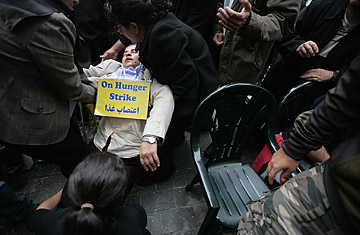
Iranian protester Farzaneh Dadkhah is helped after collapsing on the sixth day of a hunger strike outside the US embassy in central London.
Nearly every day, an ambulance comes to pick up one of the 12 Iranian hunger strikers camping out in front of the U.S. embassy in London. After a month and a half without food, some have suffered fainting spells, others vision loss or heart attacks. But the ambulance soon brings them back, because they refuse to be given IV drips. The strikers are relatives of Iranian dissidents living in a camp in central Iraq that was taken over by Iraqi police once U.S. troops had handed over control of the area. Their message to the U.S. is clear: protect their relatives and make Iraq release the 36 prisoners they took after a bloody raid of the camp at the end of July.
Outside the U.S. embassy in London's Grosvenor Square, Farzaneh Hosseini points to her 60-year-old father half asleep on a cot. He hasn't eaten in 44 days; his siblings in the camp in Iraq are starving themselves too. His other daughter, Hoda, a doctor who watches over the strikers, says he and the others have reached a point where their blood pressure is so low they could die at any time. "I hope the U.S. fulfills its promise to the people of Camp Ashraf soon," says Farzaneh.
Camp Ashraf, some 40 miles north of Baghdad, is the base for the controversial People's Mujahedin Organization of Iran, also known as the MEK. A formerly-armed group that critics say resembles a cult, the MEK helped overturn the Shah in 1979, but in the '80s clashed with former Supreme Leader Ayatullah Ruhollah Khomeini and fled Iran. Saddam Hussein let the exiles set up bases in Iraq — Camp Ashraf is the last standing — and gave the group arms and training to help him fight his war with Iran.
After the fall of Saddam in 2003, U.S. forces were protecting Camp Ashraf's approximately 3,400 inhabitants as part of an agreement in which the MEK traded in their arms in exchange for "protected persons" status under the Geneva Convention. (The U.S. considers the MEK a terrorist organization, though it has reportedly tapped the group for intelligence on Iran's nuclear program). But ever since the U.S. handed sovereignty back to the Iraqis in June, Camp Ashraf no longer feels like a safe haven. On July 28, clashes between camp dwellers and Iraqi forces left 11 Iranians dead, scores more wounded and 36 imprisoned. Now the remaining MEK members in the camp live in fear of being sent back to Iran and thrown in prison, or being displaced within Iraq, where they face deep antagonism for their former ties to Saddam.
With Baghdad and Tehran getting increasingly close, some observers think the raid was an attempt to appease Iran's ayatullahs, who consider MEK members terrorists. "This situation was predictable the day Saddam's regime fell," says Karim Pakzad, a Middle East expert at Paris' Institute of Strategic and International Relations (IRIS). "It's understandable that the Iraqis want to extend their sovereignty to a camp of former militants, whose presence they can no longer stand. But it's also become a humanitarian question: what to do with these people now?"
Since the raid, women from the camp have written letters to the U.N. claiming the Iraqi forces threatened them with rape. Both Amnesty International and Human Rights Watch have called for an investigation of excessive use of force, while an Iraqi court has ordered the prisoners' release. But the Iraqi government has kept them locked up, saying the violence only broke out after the dissidents refused to let the police establish a base at the camp.
Relatives of those living in the camp fear repeat violence, and say the camp's food, water and medical supplies have recently become severely limited. Samer Muscati, a researcher at Human Rights Watch, hopes the bloodshed is not a sign of things to come in Iraq: "Civilians have to be given basic human rights considerations, whether or not they're protected under an agreement."
Hunger strikers in Camp Ashraf — along with those starving themselves in sympathy in Washington D.C., London, Berlin, and Ottawa — are demanding that the U.S. take back protective control of the camp. In the long term, they'd like permanent U.N. protection for the dissidents. Several lawmakers and lawyer groups in Britain are voicing their support. On Sept. 9, London-based law firm Finers Stephens Innocent released a legal opinion calling on Iraq to respect the Geneva Convention in protecting the camp dwellers — and insisting the U.S. ensure their safety. (Full disclosure: Finers Stephens Innocent has represented TIME in the past.)
Middle East experts say it's unlikely, however, that the U.S. would take back control of the camp. "It would be difficult go backward now that the Iraqi government is recovering sovereignty," says Pakzad of the IRIS. "The best they and other humanitarian-minded nations could do would be to accept [the camp dwellers] as refugees." A small patrol of U.S. troops is still stationed at Camp Ashraf, but video footage of the July raid shows they did not interfere — some even withdrew into an SUV and rolled up their windows as Iranians begged them for help.
In London, the protesters say that if one of them dies, others will replace them. "I will continue my hunger strike until my family and friends are protected," says Khalil Abadi, a middle-aged man speaking breathlessly as he hangs on to a podium to address supporters on his 44th day without food. Someone helps him walk slowly back to his cot, and he lies down again, facing the U.S. embassy. Whether or not the strikers continue to go hungry, Camp Ashraf's fate depends on who has more influence on Iraq: the U.S. or Iran. And that's a contest the U.S. would be loath to lose.
